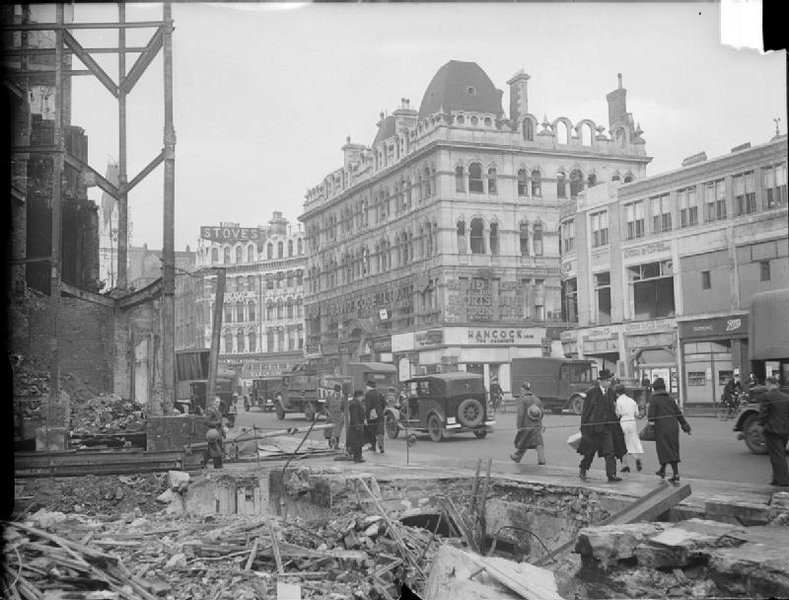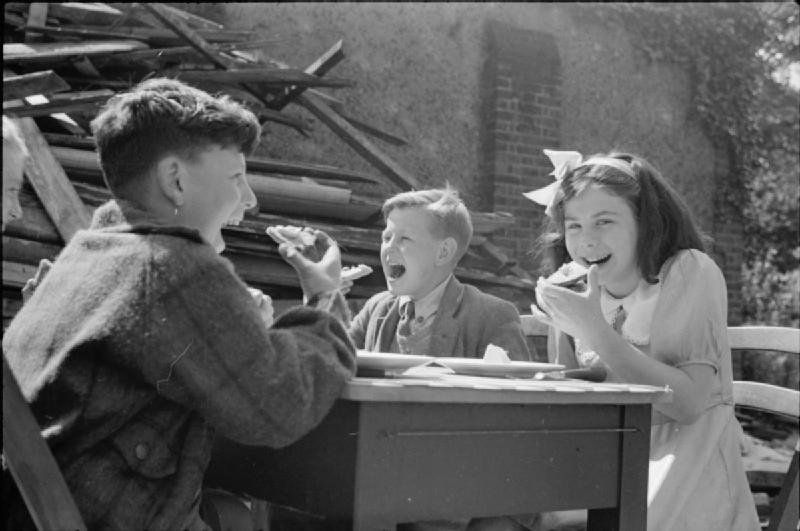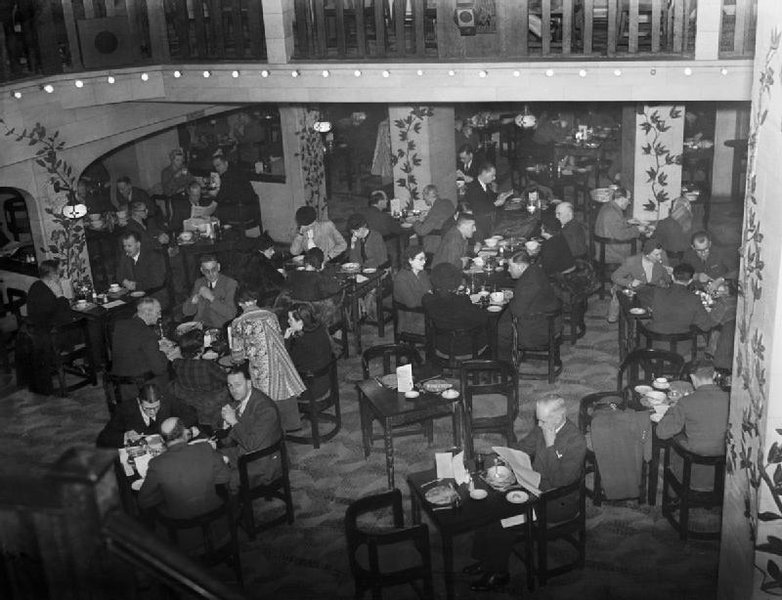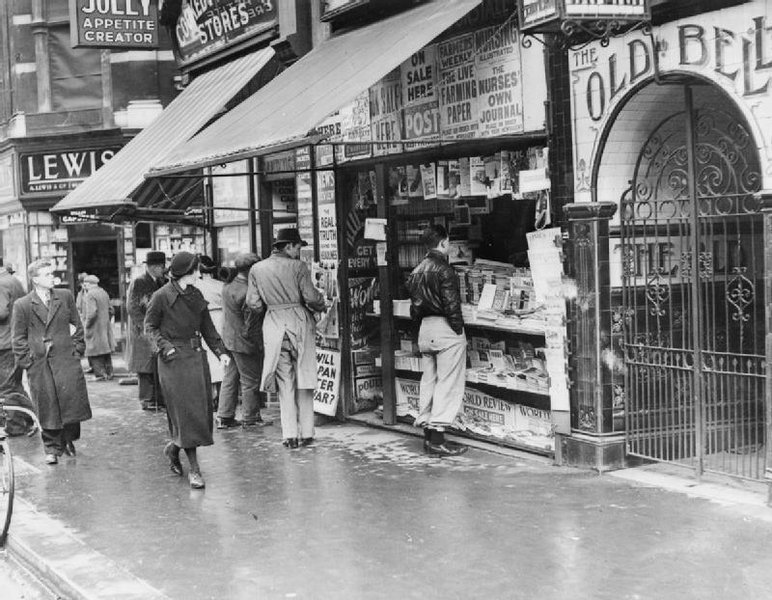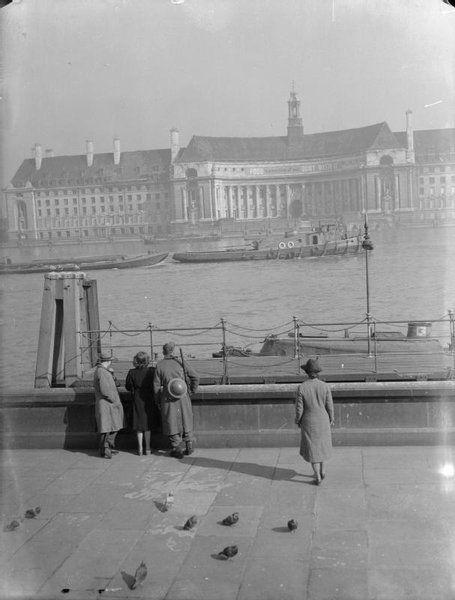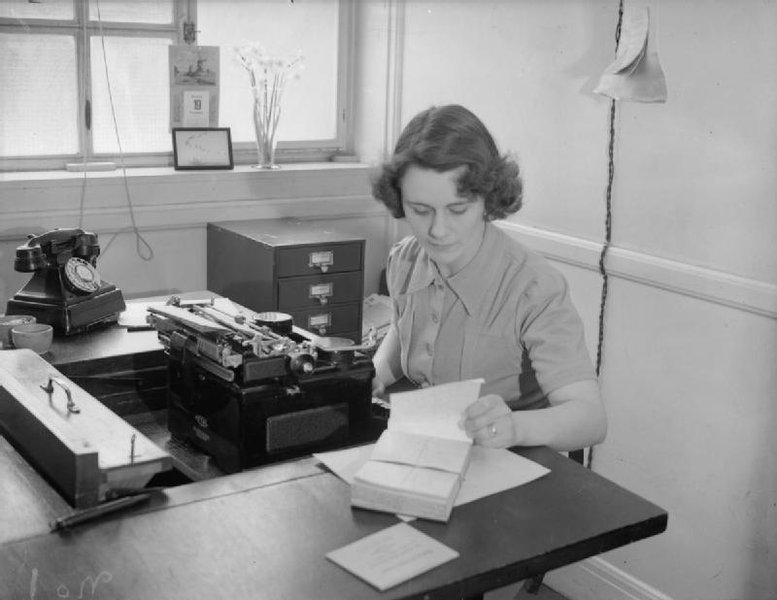Bombs dropped in the ward of: Farringdon Without
Description
Total number of bombs dropped from 7th October 1940 to 6th June 1941 in Farringdon Without:
- High Explosive Bomb
- 57
- Parachute Mine
- 2
Number of bombs dropped during the week of 7th October 1940 to 14th of October:
Number of bombs dropped during the first 24h of the Blitz:
No bombs were registered in this area
Memories in Farringdon Without
Read people's stories relating to this area:
Contributed originally by Herts Libraries (BBC WW2 People's War)
Keith Ranger — Wartime Memories Part One
Q: Can you tell me about your childhood during the war?
A: When war broke out I was 3 years old — I can’t remember much about the declaration.
Q: What were your first memories — can you remember gas masks?
A: I remember gas masks — I don’t think I had a Mickey Mouse one — my wife had a Mickey Mouse one, unfortunately she hasn’t kept it — but I know I had a gas mask and would have to go to school with gas mask over my shoulder and as we walked to school we used to pick up pieces of shrapnel, they were pieces of bombs or bullets. they used to be lying all over the road and we used to prize these if you found a nice bright silvery one they were quite treasured at school.
Q: Where were you living?
A: I lived in London. I lived near Finsbury Park, I lived on the other side of Finsbury Park to the Arsenal ground — that’s on one side and I lived on the other side of the park. I didn’t support Arsenal actually I support Tottenham Hotspur because my father was a season ticket holder at Tottenham, he actually went to White Hart Lane school so my father supported Tottenham so I supported Tottenham - whereas most of my friends supported Arsenal naturally being so close to the Arsenal ground.
It might be interesting for young people to know that the Arsenal actually shared a ground with Tottenham during the war — the Arsenal ground was commissioned by the Army — so Arsenal didn’t have a ground in those days, they used to share the ground with Tottenham and used to go along to Tottenham every Saturday because there was always a game — one week it would be Tottenham and next week it would be Arsenal at the Tottenham ground. When you went to see the games you didn’t know quite who would be playing — sometimes it was someone called ‘A.N.Other’ because they weren’t quite sure who was going to be playing, and often you would get people like Corporal so and so and one of my favourites was Sgt. Ditchburn — Ted Ditchburn who used to play in goal at Tottenham, he was a Sgt. On the programme it cost a penny I think it used to be Sgt. Ditchburn playing goal for Tottenham.
Q: Did your dad work?
A: My father worked in Smithfield Market and therefore was a reserved occupation but he had to go into London, most nights he’d come home from work got a little sleep then go back into London into the City into Smithfield and do some fire watching which was looking out for enemy aircraft, he also had to fight the blaze and repair the damage which was incurred on London during the blitz, he was in fact quite lucky towards the end of the war there were things called V2 rockets, these came after the V1 rockets, I’ll explain more about those in a moment.
The V2 you didn’t know when they were going to come they were very quick and they were the forerunner really of space travel, a lot of these people that worked on the V2 rockets were taken by the British and Americans after the war and worked on space programmes, but these rockets came across and just plunged into a town without any thought as to who they were going to hit, they weren’t targeted in any particular place.
One fell on the market itself and smashed it to smithereens, many people were killed and badly injured in that raid but my father was very fortunate in that respect because although he was in the market at the time the blast went around him because he was behind a very big pillar which held up the market and from the market there used to be a little underground railway where they used to transport the mail and the blast when it hit also travelled underneath the ground which is why it caused so many casualties and so much damage, so my father was very lucky that night. I did have picture of the market after it got hit and my eldest son actually gave it away — he gave it to someone who was doing a history of Smithfield Market and my son thought it would be very interesting to him and I haven’t seen it since, I’m not sure where that photograph is now. But it’s a rather famous photograph of the whole market in fire and collapsed buildings. It might be interesting because my wife’s father he also was in that sort of thing at one time, he did fire watching also in London until he went into the Army and went over to India but they lived in the East End, my wife’s family all come from the East End, they got very badly bombed and their house was a few that was still standing and when my father-in-law had to go to work or to go fire watching or whatever he often had to tread across all the people that were asleep in the hallway of the house to get to the front door.
I lived in London, near Finsbury Park and also near Haringey Arena. You have probably heard of Haringey which is not receiving good press at the moment, but when I lived there there used to be an Arena and a Stadium unfortunately neither are there anymore but they used to have the big boxing competitions in the Arena, even the world championships were fought in the Arena and the Stadium was next to it and they used to have speedway and greyhound racing and so on. But during the War the Arena was taken over by American troops so there were lots of Yanks around and we used to scrounge chewing gum from them, “Have you got any gum chum?” and invariably they used to give us the chewing gum and they used to give us rides in the tanks around the area.
Also the other side of Finsbury Park near Highbury Stadium was the main line out of Kings Cross so these were two areas very strategically placed for the Germans to attack so we used to have quite a lot of bombing and attacks on us and when it got quite bad, Mum decided we should be evacuated but we were evacuated to Chalfont St Giles, unfortunately Mum didn’t like it very much as it was very lonely and we were on a farm and coming from an area of London she was very lonely and there was just her and I and the people that owned the farm and after three weeks only we decided to go back to London and take our chances really. We lasted longer than my wife. She was evacuated to Peterborough and lasted ten days and they couldn’t stand it either, so they went back to London.
So when we went back to London we went back to our own house and because the raids were so bad we got, I don’t know if we had to buy them in those days or we were given them by the Government, but we had a shelter called a Morrison shelter and this was like a cage, a reinforced cage which stayed in the bedroom really and I used to sleep most of the time in this cage thing but if it got really bad, if the bombing got bad, my Mum and Dad used to get in it as well, which left my Nan, who lived with us, upstairs. If it got really bad, we had to take other action, and the action we took was to go to next door, because next door had a shelter called an Anderson shelter and this shelter was actually built in the garden. It was a very small garden that we had and it was back to back houses so the gardens were very small but they had the Anderson built in the garden and they were very kind to us and we used to have to get into this Anderson shelter so there were quite a few of us in there. So to get there we had to climb over the garden wall because we had a brick wall that separated the garden houses as you did in those days, there was a 4ft brick wall. We had to climb over this wall and not only was there a wall but because we didn’t have much food in those days even though my Dad worked in Smithfield we were rationed, so what my father did was to build some chicken runs all round the garden, and as I say, it wasn’t a very big garden, so we built these chicken runs around the garden and we also had some rabbit hutches, we used to keep rabbits on the top, so we had to climb over the wall and the chicken run and rabbit hutches to get to next doors garden to get into their shelter and my Grandmother as well so there was not only next doors family, the mother and father and their son, who was in fact my bestman when I got married. There were those three and there was all of us that got into this Anderson shelter until the all clear went and then we clambered back over the wall again into our own house.
Q: So, how often did this occur, that you had to go next door?
A: Probably two or three times a week we had to climb over the wall. It depended on the seriousness of the raid really, as you know the siren went and you would know that the bombers would start dropping, so you got prepared for that so you instinctively new if it was going to be a bad one or it was going to be just a few sort of recognisance aircraft may be dropping a few flares or something, as I say we used to go in there and pull the door shut and take our chances really. But not only did we have chickens and rabbits and we also thought we should have a duck and that would be nice for a Sunday lunch or something so we bought this duck, I can’t remember where we got it from now, I think Porterbella market we got it from. So we got this bath and sunk it in the ground at the end of the garden and put Donald the Duck in the thing, so he lasted as we just couldn’t kill him as we just didn’t have the heart to kill him, we used to kill the rabbits and the chickens and eat them but we just didn’t have the heart to kill Donald and he died of old age quite a long while after the war had finished.
Q: Presumably the chickens gave you eggs as well?
A: Oh, the chickens gave us eggs as well and things that I can remember was Mum making up the food for them and all the stuff used to go in the big pot and she used to buy some stuff to mix with it and this feed the chickens and the rabbits and also Donald of course, he was quite plump when he passed away.
Contributed originally by normanfosh (BBC WW2 People's War)
I was born in Navarino Road, Hackney, in 1929 and my first home was in Clifden Road, Homerton, where we lived until 1933. Then we moved to Firsby Road, Stamford Hill, where I was attending Northwold Road School, Stoke Newington in 1939.
The day before war was declared I was evacuated. There we all were in a crocodile clutching our cases and as we walked to the station, I saw Mum crying, frantically looking for me to say goodbye. The first time I had ever seen her cry and I was desolated. Goodness knows how long the train journey took from Upper Clapton Station or how we got from there to Old Warden in Bedfordshire
Then started the worst seven weeks of my life. Somehow or other, I finished up with
about twelve others from another class, none of whom I knew and they were all very
tough. We were billeted on the Lady of the Manor, Lady Shuttleworth. Sounded fine
but it wasn't. We were in dormitories and it could not have been more wrong for me - the first time away from home, apart from having my tonsils out in hospital. I still
shudder to think of the dinners in the village hall. Stewed rabbit twice a week; rice
without milk which they cut with a knife and added some unsweetened prunes. The
only good meal was sausages with delicious gravy. The village school was good and I soon became a member of the church choir, which I thoroughly enjoyed. Mum and Dad used to travel by coach every Sunday but had to walk a couple of miles to get to Old Warden. However, most fortunately I caught mumps after seven weeks and had to come home. I remember I had a bed down in the dining room and although the
mumps were painful, it was worth it to be home again.
Then it was a problem finding a school. The only one still operating was St Thomas's in Upper Clapton. But there were so many children wanting to go to it and so few teachers that I only went for an hour a day to start with. Then it was a day a week and increased from there. Despite that, I was one of the three who passed the Junior County Scholarship, having taken the exam at Millfield Road School in Lower Clapton.
So was I to be evacuated again? Fortunately not, because I was one of the lucky six
who got a place at Mercers' School, and whilst Mercers' was evacuated to Horsham, in September 1940 they decided to start operating from Holborn again as well, and that's where I joined them.
With the bombing, the journey to and from Holborn on the 643 trolleybus was quite
hazardous, so in the early days my mother took me to and from Holborn on the bus.
On one occasion, the 643 could not get through to Holborn so we took a bus to
Moorgate and walked through to Holborn from there. Fires were still burning and
there were firemen’s hoses everywhere. Another time, as I came out of school, the
sirens went, so we dived down into Chancery Lane Tube Station but had to get on a
train as they closed the station. So we returned home via the Central and Piccadilly lines to Manor House Station and took a 653 trolleybus home from there.
Around that time, nightly air raids began. So each night was spent in one of our cellars
in our basement, with me on a camp bed and Mum and Dad sleeping in deck chairs.
Later on we had a Morrison shelter in the basement and decided to stay in our beds
until the sirens sounded, when we came down the stairs carrying pillows and got under
the shelter until the all clear. It became such a routine that, on a couple of occasions, I
was found sleep walking with pillows under my arm at the bottom of the stairs.
When the bombs fell we used to count "one two, three ..." because I believe after a
certain number, it couldn't be you who was hit, so you were waiting for the bomb to
strike. Several times we had our windows blown in. One night an incendiary fell in
our front garden and Dad was busy dealing with that when a neighbour told us there
was another one in our back garden so we all had to dash there and put that out too.
The biggest fear was one on the roof.
Then there was one night we heard shushing which meant there was a landmine
coming down. In fact there were two falling on Clapton Common. One destroyed St
Thomas's Church and opposite a number of shops in Old Hill Street were destroyed
and about ten people were killed including our butcher Mr Bosley.
Immediately the vicar of St Thomas's, Father Dachtler, where I was a regular attender,
started the New Church Fund, and services moved to St Thomas's Hall, next door to
the Swan public house. Sometimes there was an ack-ack gun on the forecourt of the
Swan and throughout the War there was a barrage balloon on Clapton Common.
Because of the bombing, people were firewatching at home and work. Dad used to
firewatch once a week with two other Firsby Road residents, each of them, I think,
doing two hour shifts between midnight and 6am. However, in addition, he also had to firewatch at his factory in Hertford Road behind Kingsland Road Hospital once a week too. Whether they got a chance to sleep or whether they kept watch all night I am not sure. Whilst before the War, Dad made and repaired gas meters, during the War he was making fuel tanks for aircraft.
Other memories of air raid precautions were always carrying a gas mask wherever we
went, the blackout when, as there were no street lights, everybody needed a torch, and
vehicles had masked headlights and all homes had blackout curtains over all windows
so no light escaped. Even interior bus lights were put out when there was a purple
warning, when a raid was expected but was the stage before the siren actually went.
Later in the War, flying bombs, which we called doodlebugs appeared. You could see
them quite clearly, and when the engine cut out, they dived to earth and you dived for
cover. Later the V2 rockets took their place, but as they were completely silent you
received no warning. In the Summer of 1944, during morning school break, one fell
on Smithfield Market killing many people and showering us with glass in our Holborn
playground. The Headmaster decided to close the school for the rest of that term, and just brought in one class at a time to take exams in the shelter.
One enjoyable feature of the war time summers was going to school harvest camp for a month to Minster Lovell each year between 1943-1945. Quite a new experience and hard work too. In 1945, when the end of the war with Japan was announced several of us hitchhiked to London for two days to join in the VJ Day celebrations. Another school activity was being a member of the Honourable Artillery Company cadet force which met in Armoury House, City Road. That really was most enjoyable because you really felt you were contributing something to the War. Besides the military activities, we used to play football and cricket against local teams and also marched in the Lord Mayor's Show and took part in the Remembrance Day services at St Paul's Cathedral.
Of course, rationing was with us throughout the War and even continued into the first half of the 1950's. To help our food supply, Dad used to keep six chickens which ensured we were well supplied with eggs but I was not that amused trudging home from Stoke Newington High Street with a heavy bag of chicken balancer meal. Normally we did not eat many sweets, but because food was so short generally, we made sure we had our full sweet ration and there was always great excitement every Friday night to see what Dad had bought at the sweet shop. Two ounces of butter, a similar amount of cheese and ten pennyworth of meat a week really had to be stretched. Cooking and heating were difficult too, because due to the bombing, electricity, gas and water supplies were often cut off. Paraffin heaters were a real boon for cooking and heating but getting the oil was not easy.
How wonderful it was when the lights came on again and the blackout curtains came down. I remember celebrating VE Day in the West End with boys from school. It had been a long war!
Images in Farringdon Without
See historic images relating to this area:


